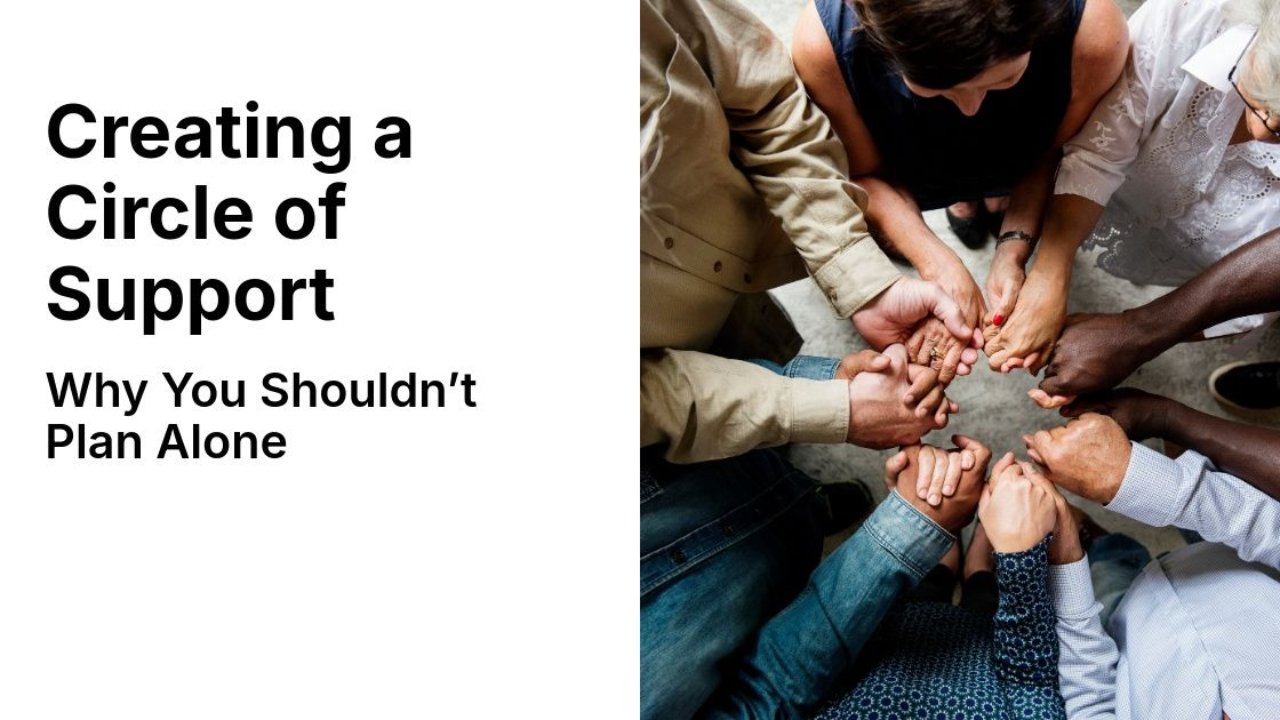Creating a Circle of Support: Why You Shouldn’t Plan Alone

If you’re a parent or caregiver of a person with a developmental disability, you may sometimes feel like everything rests on your shoulders—every appointment, every decision, every dream for the future.
And while your dedication is powerful, here’s the truth:
You don’t have to do it alone. And you shouldn’t.
Planning for a meaningful, independent life is not a one-person job. That’s where the idea of a Circle of Support comes in—a simple but powerful approach rooted in community, shared care, and person-centered values.
Let’s explore what a Circle of Support is, why it matters, and how to start building one around your loved one.
What Is a Circle of Support?
A Circle of Support is a group of people—friends, family, mentors, neighbors, professionals, or community members—who come together to support one person in living a full and self-directed life.
The person is always at the center.
The Circle exists to listen, dream, problem-solve, and help the person move toward the life they want.
Circles of Support can:
-
Help make big life decisions (like work, school, or living arrangements)
-
Offer emotional support and encouragement
-
Share ideas, connections, and resources
-
Be consistent voices of respect, trust, and possibility
And most importantly, they don’t fade away after a meeting. Many circles continue for years—becoming a lasting source of connection, security, and joy.
Why You Shouldn’t Plan Alone
It’s common for families to feel like they have to “figure it all out” by themselves. But trying to plan a person’s whole future without the right support can lead to burnout, isolation, and missed opportunities.
Here’s why creating a Circle of Support matters:
-
💬 Different perspectives spark new ideas
One person might know about a great local program, while another sees strengths you hadn’t noticed. -
🤝 It builds interdependence—not isolation
Your loved one gets to experience what it’s like to be supported by a community, not just family. -
🌱 It prepares for the future
As parents age or roles shift, a Circle can step in with continuity and care. -
🧡 It shows your loved one that they are valued by many
Just being part of a circle helps build confidence, communication, and belonging.
Who Can Be Part of a Circle?
You don’t need a huge group—and you don’t need all professionals. A great Circle often includes:
-
Siblings and extended family
-
Close friends or family friends
-
Trusted neighbors or community members
-
Teachers, coaches, support staff
-
Faith or cultural community members
-
Service providers (when appropriate)
-
And most importantly—the person themselves
The person with a disability is not just the reason for the Circle—they are an active voice in it. Their choices, preferences, and dreams lead the way.
How to Start Building a Circle of Support
-
Start small
Invite a few trusted people for coffee or a virtual gathering to talk about your loved one’s hopes and needs. -
Make it about the person
Use person-centered planning tools like a "One-Page Profile" or Life Map to spark discussion about what the person wants in life. -
Be clear about your hopes
Share that you’re not asking people to solve everything—just to walk alongside you. -
Set a rhythm
Circles can meet monthly, quarterly, or as needed. You can also connect by group text or email. -
Celebrate the wins—big and small
Whether it's landing a job interview, making a new friend, or trying something new, celebrate progress together.
Creating a Circle of Support is one of the most loving and strategic things you can do. It’s not just about planning—it’s about building a network of people who believe in your loved one and are willing to stand beside them, now and in the future.
No one should walk this journey alone. When we plan together, we dream bigger, push further, and build stronger foundations for truly person-centered lives.
Want help starting your loved one’s Circle of Support?
I’d be honored to walk alongside you. You can book a free consultation to talk through ideas, get sample tools, or plan your first gathering. Let’s build community, one connection at a time.
Book a Free Advocacy & Planning Call
If you’re curious about how we can help your loved one, let’s talk! In this free 30-minute call, we’ll:
💬 Talk about your loved one’s passions and strengths
💬 Explore possible ideas
💬 Identify first steps to turning a dream into reality

